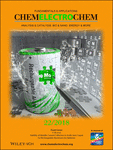
ChemElectroChem
Scope & Guideline
Empowering global scholars with open-access insights.
Introduction
Aims and Scopes
- Electrochemical Energy Storage and Conversion:
The journal focuses on advancements in energy storage technologies such as lithium-ion batteries, sodium-ion batteries, supercapacitors, and redox-flow batteries, emphasizing innovative materials and systems. - Electrocatalysis:
Research on electrocatalysts for key reactions including oxygen evolution, hydrogen evolution, and carbon dioxide reduction is a significant area, exploring both noble and non-noble metal catalysts. - Electrochemical Sensors and Biosensors:
The development of electrochemical sensors for environmental monitoring, biomedical applications, and food safety is a core focus, highlighting the integration of nanomaterials and novel detection techniques. - Materials Science in Electrochemistry:
The journal publishes studies on the synthesis, characterization, and application of novel materials, including metal-organic frameworks, carbon nanomaterials, and transition metal oxides. - Computational Electrochemistry:
Theoretical and computational studies that provide insights into electrochemical processes, mechanisms, and material properties are also prominently featured. - Sustainable and Green Chemistry:
Research that addresses sustainability in electrochemical systems, such as the use of renewable materials and processes for energy conversion and storage, is increasingly important.
Trending and Emerging
- Hybrid Energy Storage Systems:
There is a growing interest in hybrid systems that combine different energy storage technologies, such as lithium-sulfur batteries and supercapacitors, aiming to enhance energy density and performance. - Electrochemical Carbon Dioxide Reduction:
Research focused on the electrochemical reduction of CO2 into valuable chemicals is rapidly increasing, driven by global sustainability goals and the need for carbon-neutral technologies. - Advanced Electrode Materials:
The development of novel and functionalized electrode materials, including 2D materials and nanocomposites, is a significant trend, as researchers seek to improve performance and efficiency in various electrochemical applications. - Machine Learning and Artificial Intelligence in Electrochemistry:
Machine learning techniques are increasingly being applied to predict material properties and optimize electrochemical processes, suggesting a fusion of computational methods with experimental electrochemistry. - Biomimetic and Bioinspired Systems:
There is an emerging focus on biomimetic and bioinspired approaches to electrochemical systems, leveraging natural processes for improved efficiency and sustainability in energy conversion and storage.
Declining or Waning
- Traditional Organic Electrosynthesis:
Research focused solely on organic electrosynthesis without integrating modern materials or techniques has seen a decrease, likely due to the growing emphasis on more innovative and sustainable approaches. - Noble Metal Catalysis:
While still relevant, there is a noted decline in the dominance of noble metal catalysts in favor of more sustainable non-precious alternatives, reflecting a shift in research priorities towards cost-effective and environmentally friendly solutions. - Basic Electrochemical Theory:
Papers centered on fundamental electrochemical theory without practical application or novel insights are becoming less common, as the focus shifts towards applied research with immediate societal impact. - Low-Efficiency Energy Systems:
Research on low-efficiency energy systems that do not leverage new materials or technologies is less prevalent, as there is a strong push towards high-performance and scalable solutions.
Similar Journals

JOURNAL OF THE ELECTROCHEMICAL SOCIETY
Fostering Collaborative Progress in Electrochemical ScienceJOURNAL OF THE ELECTROCHEMICAL SOCIETY, published by the ELECTROCHEMICAL SOCIETY INC, is a leading peer-reviewed academic journal dedicated to advancing the field of electrochemistry and its myriad applications. With an ISSN of 0013-4651 and E-ISSN of 1945-7111, this esteemed journal has been a pivotal platform for research since its inception in 1948, with convergence periods allowing for a rich historical context of study through to 2024. Recognized for its high impact, it holds a noteworthy Q1 ranking in several categories including Condensed Matter Physics and Materials Chemistry, and it is Q2 ranked in both Electrochemistry and Renewable Energy. This journal features a range of articles that encompass both theoretical and experimental advancements, making it a crucial resource for researchers, professionals, and students keen on exploring cutting-edge developments in materials science, energy solutions, and sustainable technologies. Although it is not an open access journal, its rigorous standards ensure that published work significantly contributes to the body of knowledge within its fields, fostering innovative research and collaborative progress.
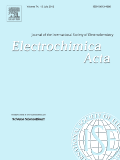
ELECTROCHIMICA ACTA
Leading the Charge in Cutting-Edge Electrochemical ResearchELECTROCHIMICA ACTA is a prestigious academic journal dedicated to the field of electrochemistry and chemical engineering. Published by PERGAMON-ELSEVIER SCIENCE LTD, this journal stands out with its impressive impact factor and is categorized in the top quartile (Q1) for both Chemical Engineering and Electrochemistry in 2023, further cementing its role as a leading venue for cutting-edge research. With a publication history dating back to 1959 and converging into 2024, it has established a substantial archive of influential articles that explore various aspects of electrochemical processes, materials, and applications. Researchers and professionals in the field benefit from the journal’s high visibility, as it ranks remarkably well according to Scopus metrics, with a position in the 90th percentile for General Chemical Engineering and 84th percentile for Electrochemistry. Although ELECTROCHIMICA ACTA does not currently offer open access, it continues to serve as a vital resource for those seeking to expand their knowledge and explore innovative developments in electrochemical science.
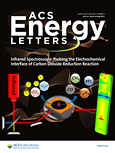
ACS Energy Letters
Exploring Cutting-Edge Research in Energy ScienceACS Energy Letters, published by the American Chemical Society, is a prestigious peer-reviewed journal designed to disseminate innovative and impactful research in the multifaceted field of energy science. Since its inception in 2016, the journal has quickly ascended to a remarkable status, achieving Q1 rankings in critical categories including Chemistry (miscellaneous), Energy Engineering and Power Technology, Fuel Technology, Materials Chemistry, and Renewable Energy, Sustainability and the Environment as of 2023. With an emphasis on rigorous research methodologies and interdisciplinary collaboration, ACS Energy Letters serves as a vital platform for scholars, professionals, and students to explore cutting-edge research that addresses contemporary energy challenges. While maintaining a commitment to advancing knowledge without open access, it offers profound insights into sustainable practices and innovative solutions that are crucial for the future of energy systems globally. The journal's esteemed standing in the chemical and energy sectors underscores its significance, making it an essential resource for anyone invested in the advancement of energy technologies and sustainable practices.

Electrochemical Science Advances
Pioneering Discoveries in Electrochemical ResearchElectrochemical Science Advances, published by WILEY, is an esteemed Open Access journal that has been making significant contributions to the field of electrochemistry since its inception in 2021. With an ISSN of 2698-5977, this journal serves as a vital platform for researchers and practitioners looking to disseminate their findings on a diverse range of topics within the electrochemical sciences and related areas. The journal has achieved commendable rankings in the Scopus database, placing it in the 2nd quartile in Chemistry (miscellaneous) and the 3rd quartile in Electrochemistry, highlighting its relevance and growing influence in the academic community. As it converges from 2021 to 2024, Electrochemical Science Advances aims to foster collaboration and innovation, offering a vital resource for students, professionals, and researchers dedicated to advancing knowledge and technology in electrochemistry. Access to this cutting-edge research is straightforward, allowing for a comprehensive engagement with the latest advances in the field.

Carbon Letters
Leading the Charge in Energy Engineering.Carbon Letters, published by SPRINGER JAPAN KK, is a premier academic journal based in Singapore that focuses on groundbreaking research in the fields of Ceramics and Composites, Energy Engineering, Inorganic Chemistry, Materials Chemistry, and Organic Chemistry. With an exceptional reputation reflected in its 2023 category quartiles, which include Q1 rankings across multiple disciplines, this journal serves as a vital resource for researchers and professionals seeking to stay at the forefront of carbon-related studies and applications. Although it is not an open access publication, Carbon Letters facilitates the dissemination of high-quality research addressing contemporary challenges in renewable energy, sustainability, and environmental engineering, supporting the academic community's efforts in advancing science and technology. The journal has a robust converged period from 2014 to 2024, signaling its ongoing commitment to excellence in academia.

International Journal of Electrochemical Science
Innovating electrochemistry for a sustainable future.International Journal of Electrochemical Science is a peer-reviewed journal dedicated to disseminating cutting-edge research in the field of electrochemistry. Published by Elsevier in Serbia, this journal serves as a vital platform for scientists and researchers to explore innovative electrochemical techniques, processes, and applications. With an ISSN of 1452-3981, it has been a respected source of scholarly articles since its inception in 2006 and continues to bridge the gap between theoretical advancements and practical implementations up until 2024. Notably, it holds a Q4 quartile ranking in the field of electrochemistry and ranks 41 out of 60 in the Scopus database, situating it within the 32nd percentile among its peers. The journal champions open academic discourse, contributing significantly to the advancement of knowledge in electrochemical sciences, making it an essential resource for researchers, professionals, and students alike who are striving towards new discoveries and innovations.
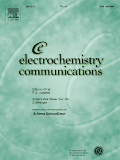
ELECTROCHEMISTRY COMMUNICATIONS
Transforming Ideas into Solutions in Electrochemical ApplicationsELECTROCHEMISTRY COMMUNICATIONS, published by ELSEVIER SCIENCE INC, is a leading journal in the field of electrochemistry, holding a prestigious position in the Q1 quartile since 2023. With an impact factor reflecting its esteemed reputation, the journal ranks #15 out of 60 in the Scopus Chemistry category for Electrochemistry, placing it in the 75th percentile. Since adopting an Open Access model in 2019, it has garnered widespread visibility and accessibility, enabling researchers and professionals to share groundbreaking findings and foster innovation. Covering a wide range of topics from fundamental electrochemical research to practical applications, ELECTROCHEMISTRY COMMUNICATIONS serves as a critical platform for disseminating knowledge and advancing the field. The journal's commitment to quality and relevance positions it as a vital resource for academics and practitioners striving to stay at the forefront of electrochemical science.

Electrochemical Energy Reviews
Empowering Scholars to Shape Tomorrow's Energy SolutionsElectrochemical Energy Reviews, published by SpringerNature, serves as an essential platform for the dissemination of cutting-edge research in the fields of electrochemistry, material science, and energy engineering. With an impressive impact factor and ranked in the Q1 category across multiple disciplines including Chemical Engineering and Energy Technology, this journal highlights its commitment to advancing knowledge and innovation within the energy sector. Operating since 2018, the journal not only provides a valuable resource for researchers and professionals but also invites contributions from students and emerging scholars interested in the pivotal role of electrochemical processes in sustainable energy solutions. Published in Germany and widely accessible to the global research community, Electrochemical Energy Reviews is an indispensable reference for those keen on exploring the future of energy technologies.
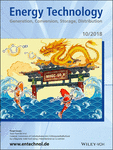
Energy Technology
Driving Progress in Energy Efficiency and SustainabilityEnergy Technology, published by Wiley-VCH Verlag GmbH, is a prominent peer-reviewed journal dedicated to advancing the field of energy research and technology. With an ISSN of 2194-4288 and an E-ISSN of 2194-4296, this journal has made a significant impact in the energy sector, holding a Q2 category ranking in the Energy (miscellaneous) category for 2023, and proudly positioned in the 77th percentile within the Scopus ranking for General Energy. Since its inception in 2013, Energy Technology has consistently published cutting-edge research, innovations, and reviews that cater to a wide array of topics including renewable energy, sustainable technologies, and energy efficiency. The journal does not offer open access, yet it remains a key resource for researchers, professionals, and students who are committed to exploring the dynamic field of energy. The journal's efforts to disseminate rigorous scholarship make it an invaluable asset for anyone looking to contribute to or understand the future of energy-related technologies until 2024.

ACTA CHIMICA SINICA
Exploring Diverse Horizons in Chemical ResearchACTA CHIMICA SINICA, published by SCIENCE PRESS, is a distinguished peer-reviewed journal in the realm of Chemistry, specifically focusing on general and miscellaneous chemistry fields. Since its inception in 1982, the journal has consistently contributed to the advancement of chemical research in China and beyond, maintaining a reputable standing within the academic community, evidenced by its 2023 Scopus ranking of #197 out of 408 in its category. With a current impact factor placing it in the Q3 quartile, ACTA CHIMICA SINICA aims to disseminate innovative research findings, covering a wide spectrum of topics within the discipline. Although it is not an open-access journal, it offers various access options through institutional subscriptions, ensuring that its high-quality content is available to a broad audience. Researchers, professionals, and students alike will find this journal a vital resource for keeping abreast of developments in the field and for contributing their own findings to an engaged scientific community.